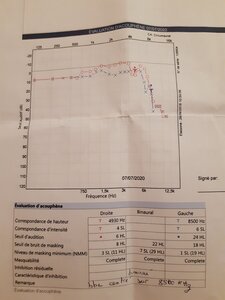It seems silly that a little machine that is specifically designed to produce tones cannot produce specific tones. Frequencies on a standard audiogram are just a fraction of what we can hear. By using an online tone generator I feel I have hearing loss at 1100 Hz and I also have horrible tinnitus at that frequency, but I have no way of confirming it except by comparing the left ear to the right ear. I have normal hearing at 1000 Hz so it seems a 100 Hz+- range is enough to be missed on a hearing test.
Also is there anything medically special about the tones they use in an audiogram? e.g. 250 Hz, 500 Hz, 1000 Hz, 2000 Hz etc...
Also is there anything medically special about the tones they use in an audiogram? e.g. 250 Hz, 500 Hz, 1000 Hz, 2000 Hz etc...

 Member
Member

